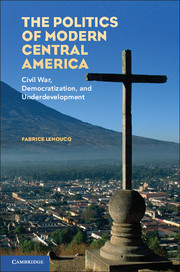Book contents
- Frontmatter
- Contents
- Figures
- Tables
- Introduction
- 1 Central America on the Eve of the 1980s
- 2 Civil War, Revolution, and Economic Collapse
- 3 Stalemates, Peace Negotiations, and Democratization
- 4 Economic Stability, Lackluster Growth, and Social Change
- 5 Democratization, State Capacity, and Redistribution
- Conclusion
- Bibliography
- Index
3 - Stalemates, Peace Negotiations, and Democratization
Published online by Cambridge University Press: 05 September 2012
- Frontmatter
- Contents
- Figures
- Tables
- Introduction
- 1 Central America on the Eve of the 1980s
- 2 Civil War, Revolution, and Economic Collapse
- 3 Stalemates, Peace Negotiations, and Democratization
- 4 Economic Stability, Lackluster Growth, and Social Change
- 5 Democratization, State Capacity, and Redistribution
- Conclusion
- Bibliography
- Index
Summary
Introduction
Civil war engulfed Central America in the 1980s. A peace agreement was not signed in El Salvador until late 1992, although the fighting between the government and the FMLN had dissipated to an inconclusive war by the late 1980s. The civil war in Guatemala did not end until 1996, although its military had defeated the insurgents, at a great loss of life, by the mid-1980s. No sooner had Nicaraguans overthrown the Somoza dictatorship than the Sandinistas became embroiled in another civil war, one that pitted them against an irregular army organized by former members of the Somoza’s National Guard (the Contras) and supported by the Reagan administration.
The 1980s were the decade of civil war not only on the isthmus, but also throughout the world. At the start of this decade, less than 15 percent of the world’s countries witnessed insurgents contesting governments in bloody conflicts. By the end of this decade, civil war had started or continued in more than 20 percent of all countries (Fearon and Laitin, 2003). The equivalent figure for Central America was high: Three of the seven countries, or more than 40 percent of them, were engulfed in bloody civil wars.
The 1980s were also the start of what Samuel Huntington ( 1991 ) called the “Third Wave ” of democratization. At the start of this decade, autocracies existed in most countries. By the end of the 1980s, however, there were more democracies than dictatorships. By the mid-1990s, the majority of political systems allowed all adults at least eighteen years old to cast ballots in regularly scheduled and competitive elections and, to one extent or another, respected the civil rights of the citizenry (Lehoucq, 2011 ).
- Type
- Chapter
- Information
- The Politics of Modern Central AmericaCivil War, Democratization, and Underdevelopment, pp. 66 - 96Publisher: Cambridge University PressPrint publication year: 2012

